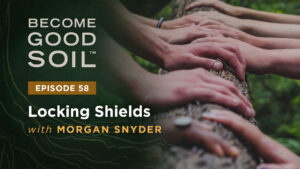Podcast: Subscribe in iTunes | Play in new window | Download
No life of faith can be lived privately. There must be overflow into the lives of others.
–Eugene Peterson

Seventy-two years ago, a novel threat emerged on the earth, inciting a proportionate pandemic of fear around the globe. In that hour, it was the advent of the atomic bomb, a weapon whose potential for immediate and global destruction was unprecedented. The pressing and consequential question of that age was “How should we now live in light of this new and deadly threat?” C. S. Lewis wrote the following in response:
In one way we think a great deal too much of the atomic bomb. “How are we to live in an atomic age?” I am tempted to reply: “Why, as you would have lived in the sixteenth century when the plague visited London almost every year, or as you would have lived in a Viking age when raiders from Scandinavia might land and cut your throat any night; or indeed, as you are already living in an age of cancer, an age of syphilis, an age of paralysis, an age of air raids, an age of railway accidents, an age of motor accidents.”
In other words, do not let us begin by exaggerating the novelty of our situation. Believe me, dear sir or madam, you and all whom you love were already sentenced to death before the atomic bomb was invented: and quite a high percentage of us were going to die in unpleasant ways. We had, indeed, one very great advantage over our ancestors—anesthetics; but we have that still. It is perfectly ridiculous to go about whimpering and drawing long faces because the scientists have added one more chance of painful and premature death to a world which already bristled with such chances and in which death itself was not a chance at all, but a certainty.This is the first point to be made: and the first action to be taken is to pull ourselves together. If we are all going to be destroyed by an atomic bomb, let that bomb when it comes find us doing sensible and human things—praying, working, teaching, reading, listening to music, bathing the children, playing tennis, chatting to our friends over a pint and a game of darts—not huddled together like frightened sheep and thinking about bombs. They may break our bodies (a microbe can do that) but they need not dominate our minds.
“On Living in an Atomic Age” (1948) in Present Concerns: Journalistic Essays
Following Lewis’s counsel, one of the “human things” we can do is gather, albeit virtually, to connect and be strengthened by the stories of others. Together, we can imagine, dream, question, and unite in prayer, and thereby enact a power beyond ourselves that will steady and focus us as we continue in the sacred and sometimes mundane work of being found at our post on any and every day.
To this end, I have gathered some of my most trusted companions for mutual strengthening; we are inviting you to gather with us as well. Our hope is that as a global fellowship of like-hearted men, we can encourage each other in “sensible and human things,” and as one, bring more and more of the reign of Heaven to more and more of the domain of earth.
Our world is at a rare juncture; the global crisis of our age offers a fresh and remarkably accessible opportunity to return our need and our personal story back to the Hero and Author of the Larger Story from which we originated. There is so much goodness to fight for here. Long-standing strongholds can be broken. Shattered relationships and lives can be restored. Lost things can be found. Life can be recovered. Light shines brighter in darkness. Come, join us. We’re glad you’re here.
For the Kingdom,

Podcast: Play in new window | Download
Subscribe: Apple Podcasts | Android | RSS
